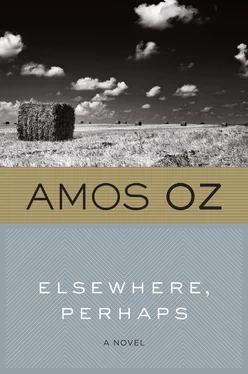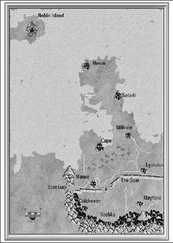"The bedclothes need changing."
Noga throws her a sidelong glance, and answers after a deliberate interval:
"Yes."
Bronka asks:
"Does he sleep well at night? If not, I've got some very good pills."
Noga says:
"I don't know. I don't ask him how he sleeps at night."
Bronka says:
"There are some boxes of grapes outside the kitchens. I'll go and fetch some."
Noga says:
"Thank you."
Bronka says:
"You don't have to thank me."
Noga asks with a calm, calculated smile:
"Why not?"
After a few days Reuven went to hospital for a checkup. The results of the examination came in the post at the end of the week. He was not suffering from a malignant disease. The examination had revealed a slight dilation of the blood vessels that, in conjunction with instability and frequent fluctuations in the blood pressure, could give rise to a certain anxiety. Anxiety, not panic, the kibbutz doctor emphasized to the patient. There was no danger. The conclusions were self-evident: to avoid all tension, take plenty of rest, abstain from certain foods, not to give up physical work but not to overdo it. Gardening was an excellent form of exercise. Above all, not to fall prey to depression. The latest expert opinion was that depression has a direct effect on the bodily organs, and the blood vessels provided the prime example. There was no danger, no defect, certainly no cause for panic, only a temporary unpleasantness that demanded a measure of caution and restraint.
One evening Bronka called on Reuven to ask whether he would like to go to the meeting of the classical music circle. She thought it would do him good to go. It would take his mind off his gloomy thoughts. Reuven replied that music would only aggravate his recent tendency to depression. Bronka said that his isolation was encouraging unkind speculation. Reuven answered that he did not consider himself above being judged by his fellows. In any case, he added, waving a frail arm in the general direction of the window, as people grew older they must keep their eyes open. Bronka said she did not see exactly what he was getting at. Reuven did not answer. The room grew darker. Outside the lamp came on and cast a faint light through the window. Reuven groaned. Bronka asked anxiously if he was feeling ill. Reuven ignored her question and said:
"Bronka, very soon you're going to be grandmother to a dear little granddaughter. I've been thinking, perhaps… Perhaps you ought to tell Ezra…"
Before he had finished his sentence Bronka got up from her chair and came over to sit on the edge of his bed. She rolled back the blanket and laid her kind, wrinkled hand on his chest. Her voice when she spoke was full of emotion:
"Reuven."
"Yes?"
"I beg of you…"
"Yes. Carry on."
"Get up. Let's go and listen to the music."
"You know, Bronka, I never took Ezra seriously."
"I don't understand. What are you trying to say?"
"I hadn't judged him, if you see what I mean. Until the day we traveled back from Tel Aviv together. After what happened at the bus station. I was shattered. He didn't gloat. No. That journey opened my eyes. I saw him. I saw that he… that he was alive. Do you know what he talked to me about all the way?"
"The Bible? The fishermen? His two brothers?"
"No. About death. He said the important thing wasn't to die gloriously. It was to die as late as possible. You remember the Dutch colonel? You know, I told you about him. When you're ill, you connect things in your mind. I made the connection. He too…"
"Don't talk about that."
"Bronka, we, you, me, Ezra, we're past the halfway mark. We're nearer to the end of the journey than the start. I've got to go back. I've forgotten something at an earlier stop. It doesn't matter. It was a line from a poem I shan't write. It's sad. There's something else I have to say. After all… all that, you'd think… I thought all that would count in my favour… But no. There are no reductions. No privileges. Not even for… It doesn't matter. I don't think the system is right. But that's not the main point. The main point," Reuven continued after a pause, his warm, steady voice filling the room, filling the darkness, "the main point is that we both have children, and our children judge us and they don't judge us fairly. It's dark outside, Bronka, and outside in the dark my daughter is living a wild life. How does she think of me? A tedious sermonizer. A quitter. A man who didn't have the strength to save her mother for her. A loser. A disgrace, Bronka, that's how she thinks of me. She lives a wild life outside in the dark, she hates words, Bronka. What does she think of me? She's out there now. I'm jealous of her. I'm jealous for her. She doesn't belong to me. She'll go somewhere else."
"Reuven."
"But I'm not ashamed. I may not be a winner…"
"Reuven, I'll stay here. I won't go to the music. I'll put the kettle on. We'll have some tea."
"I may not be a winner, but I'm not ashamed for a moment. Of anything. I'm not ashamed of my poems. And I'm not ashamed of my children. Even if they go away. Even if they make fun of me. Even if they change. I'm not ashamed of anything in my world. Bronka."
"Yes."
"What will you do if Einav has a boy instead of a girl?"
"What a funny question. What'll I do? What can I do? What a strange question."
"It doesn't matter. Bronka."
"Yes."
"I've changed my mind."
"What about?"
"The music. I'll get dressed. We'll go."
"We'll go?"
"Wait. The kettle's boiling. Have some tea first."
"Coffee. I'd rather have coffee."
"But…"
"And then we'll go. Together."
And on Saturday morning, when Reuven was sitting in a deck chair in his little garden and Noga was lying next to him on the grass and asking if he shouldn't go indoors because it was getting very hot outside, Reuven answered her question with one of his own.
"Stella, you used to read a lot of poetry. Do you still have the time and the inclination to read poetry?"
"Why do you ask?"
"It occurred to me that we might… that it would be nice if you and I could read poems together one evening a week.
"If you like, I've got no…"
"No, you don't have to. No."
"Daddy," Noga said, "there's something I've always wanted to say to you, but I never know how to say it. It's that people… that people are people. Take yourself, for instance. You should let yourself be. Don't force yourself to be words. People can't ever be words. And you… You don't have to keep on proving. You're not a proof. You're You're a person. I haven't said it very well, have I? You haven't understood. I can't explain. I've got to tell you. But I don't know how to."
"So you don't want to. You don't want us to read poetry together one evening a week. You don't have to. I just thought we might, perhaps, we might start with…"
22. MORE OF THE BLESSED ROUTINE
With eyes like hawks' we observe our neighbors' actions. Our judgments take effect in a hundred and one devious ways.
Let us eavesdrop, for example, on the conversations in the communal clothes store. Here the long hot hours crawl sluggishly on, hours of ironing and mending and sorting clothes. The cupboards are divided into compartments, family by family, like the cells in a honeycomb.
Einav Geva tells Nina Goldring what she has heard from Dafna Isarov. Nina Goldring tells Einav Geva what she has heard from Yitzhak Friedrich, the treasurer. Fruma Rominov tells Hasia Ramigolski, on the authority of Gerda Zohar, who heard from Bronka Berger, the original source: Reuven Harish is worn out and depressed. Because of his illness and also because of his daughter. Apropos of which, some say that Ezra Berger has written to his brother in Germany, the one called Zechariah, who changed his name to Siegfried, and hinted in his usual apothegmatic way at the new complication.
Читать дальше












